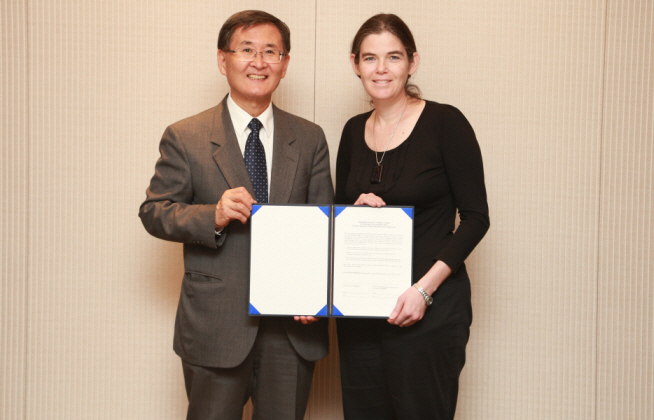policy
Signed a partnership agreement with Coursera to provide millions of people with online courses in science and technology.
The Korea Advanced Institute of Science and Technology (KAIST), a world-leading research university focusing on science, engineering and technology, joined a new, online platform for open access that serves the needs of Korean and global learners.
KAIST and Coursera, the world"s largest provider of massive open online courses (MOOCs), agreed on October 14th, 2013 to partner for the provision of internet-based open learning, through which the university expects to reinforce its current education initiative, Education 3.0.
Steve Kang, president of KAIST, was upbeat about the partnership.
"We know the benefits and importance of online education that will significantly impact the landscape of today"s higher education. Hopefully, our partnership with Coursera will expand our initiative to continuously provide quality education globally."
With its network of 107 prestigious partner universities and public institutions worldwide, Coursera offers 482 free online courses across a wide field of humanities, science, engineering, and business to 5 million students around the globe.
KAIST will be able to utilize top-notch online courses and lecture contents available on the company"s website. The university can also supply its online courses to the global community, allowing the faculty"s top quality lectures to reach hundreds and thousands of students and adult learners throughout the world.
Incorporating advanced information and communications technology, KAIST has implemented a new, smart education program, Education 3.0, since 2012 to effectively meet the growing demands of creating a better and more interactive learning and teaching environment for students and faculty. Under Education 3.0, students study online and meet in groups with a professor for discussions and problem solving.
Tae-Eog Lee, Director of the Center for Excellence in Learning & Teaching at KAIST, said:
"We received a phenomenal response from students and professors to the courses made available under Education 3.0. For this year alone, we are offering 60 courses, such classes as calculus, general biology, basic programming, design and communication, bioengineering fundamentals, and logic and artificial intelligence."
Professor Lee added:
"It has turned out that our education initiative is not only useful to our students but also quite popular among learners outside the university and Korea. It"s a great thing that KAIST can contribute to the world"s concerted efforts to provide equal opportunities for learning. At the same time, we look forward to seeing the benefits of MOOC-based content being used in our classrooms."
Founded in 2012 by two eminent Stanford University professors, Coursera has held a strong lead in MOOCs. Unlike the traditional online education model, open courseware (OCW), designed for simply sharing lecture materials including videos, slides, and data through the internet, MOOCs develop and evaluate courses, lecture contents, and delivery quality to meet high academic standards—In order to earn credits, subscribers (universities and students) are required to submit course registration, specification, and description; student attendance roster; homework and assignments; and assessment.
Daphne Koller, co-founder of Coursera, commented on the partnership agreement with KAIST:
"We are honored to have so many brilliant minds working together to expand educational opportunities globally. To be able to offer courses from professors at the forefront of their fields to millions of people is truly remarkable, and our students remind us daily of the value of spreading this knowledge globally."
Among the partner universities and institutions are Stanford University, California Institute of Technology, Columbia University, École Polytechnique Fédérale de Lausanne, Technion-Israel Institute of Technology, the National University of Singapore, the University of Tokyo, the World Bank, and Shanghai Jiao Tong University.
President Steve Kang (in the left) singed a partnership agreement with Dr. Daphne Koller (in the right), president and CEO of Coursera.

-
policy KAIST's Top 10 Contributions to Korea and the World
Established in 1971, the Korea Advanced Institute of Science and Technology (KAIST) started off as a relatively modest graduate school in a few disciplines in science and technology, but has gradually expanded into a full-fledged research university over the years. From the beginning, KAIST was intended to offer an elite science education, setting it apart from other universities in Korea. A majority of its graduates have contributed to the development of, what the world now praises, Korean
2015-11-27 -
people KAIST-Coursera Course: Introduction to Acoustics Engineering
Professor Yang-Hann Kim of Mechanical Engineering at KAIST has been offering an online course entitled “Introduction to Acoustics” on Corsera, the world’s largest MOOCs (Massive Open Online Courses) provider, from May 12th. KAIST offered three Coursera classes during a spring semester in 2014, and Professor Kim’s course was the first one provided by the university to global learners. Professor Kim has immersed himself in research and education on acoustics engineer
2014-05-25 -
policy KAIST Offers Massive Open Online Courses (MOOCs) to Global Learners
Global learners can now take premier engineering courses offered by the Korea Advanced Institute of Science and Technology (KAIST) through one of the leading online education providers, Coursera. KAIST has begun offering three massive open online courses (MOOCs) to reach millions of students on the Internet. Collaborating with Coursera to provide a MOOC platform, KAIST will extend its excellence in science and engineering to a broader global audience while using technology to enhance the class
2014-05-14